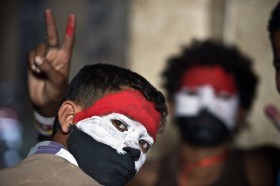 Egypt’s Muslim Brotherhood called for a mass rally today to demand the reinstatement of deposed President Mohamed Mursi as Prime Minister-designate Hazem El-Beblawi prepared his Cabinet.
Egypt’s Muslim Brotherhood called for a mass rally today to demand the reinstatement of deposed President Mohamed Mursi as Prime Minister-designate Hazem El-Beblawi prepared his Cabinet.
The rally is to maintain the Muslim Brotherhood’s campaign to reverse the ouster of Islamist Mursi, whom the army deposed on July 3 and detained after protests against him by tens of thousands of Egyptians. Defense Minister Abdelfatah al-Seesi defended the military’s action yesterday, saying it was “in the service of the people.”
The Cabinet took shape, with former ambassador to the U.S. Nabil Fahmy saying yesterday he would be foreign minister, and Ahmed Galal, an ex-World Bank official, accepting the post of Finance Minister. Ziad Bahaa-Eldin, a former regulator of financial markets, said he will become deputy premier and international cooperation minister. Nobel Laureate Mohamed ElBaradei, previously the United Nations nuclear watchdog chief, took office as vice president for international relations.
“What’s taking place in Egypt’s political scene is a farce that must and will come to an end,” Hamza Zawba, a spokesman for the Brotherhood’s political arm, the Freedom and Justice Party, said by phone yesterday. “Egyptians will take to the streets of Cairo to defend their legitimate president.”
Demonstrations last week turned violent, with more than 50 of Mursi’s supporters killed in a clash with the army that each side blames on the other.
Clashes, Attack
Mursi supporters and opponents clashed in the Nile delta town of Mahalla yesterday with three people wounded, the state-run Middle East News Agency reported. The violence closed roads in the city, it said. Ahram Gate reported that 20 Mursi supporters were wounded in the delta province of Kafr El-Sheikh.
In the northern Sinai peninsula, at least three people were killed and 17 wounded early today when rocket-propelled grenades were used to attack a bus carrying workers employed at a cement factory near al-Arish International Airport, according to Ahram Gate. The state-run news service described the attackers as suspected militants.
International Pressure
Al-Seesi’s defense of the army’s action reflected mounting international pressure on the military leadership since it deposed Mursi, Egypt’s first democratically elected civilian president.
“If circumstances forced the armed forces to approach the political process, it did so because the people summoned it for that mission,” he said at a meeting with armed forces officers and commanders in comments published on the military spokesman’s Facebook page.
The U.S. sent Deputy Secretary of State Bill Burns to Egypt to meet with members of the interim government and civilian and business leaders in a visit that will last until tomorrow, according to the State Department. The U.S. and Germany have called for Mursi’s release from army custody.
Burns will emphasize the Obama administration’s support “for an inclusive democratic process where all political streams and sectors of society are represented, the need to transition to a democratically elected government as soon as possible, and the immediate need for all political leaders to work to prevent violence and incitement,” State Department spokeswoman Jen Psaki said yesterday in an e-mailed statement.
While Psaki said Burns will meet with “political party representatives” and “religious leaders,” she didn’t specify whether he will attempt to see representatives of the Muslim Brotherhood.
Policy Change
The interim Cabinet will steer the country until a vote for parliament and the president expected to be held by early next year. It will seek to revive the economy while leaving “significant policy changes” to an elected government, Bahaa-Eldin said.
“Its job is to put the country back on the democratic path and prepare for elections,” he said by phone. The Cabinet will work to restore “some measure of security, some measure of political consensus, revive the stagnant economy and seek to make gains in social justice.”
The economy is stuck in its worst slowdown in two decades. Unemployment is at a record high and foreign reserves are less than half their levels in December 2010, two months before Hosni Mubarak was ousted.
Gulf Arab countries have offered billions of dollars to aid Egypt since Mursi’s ouster. Kuwait extended a $4 billion aid package on July 10, adding to the $8 billion promised by Saudi Arabia and the United Arab Emirates.
Egypt’s benchmark EGX 30 Index climbed 0.6 percent to 5308.85, the highest value since July 10, at the close in Cairo yesterday.
